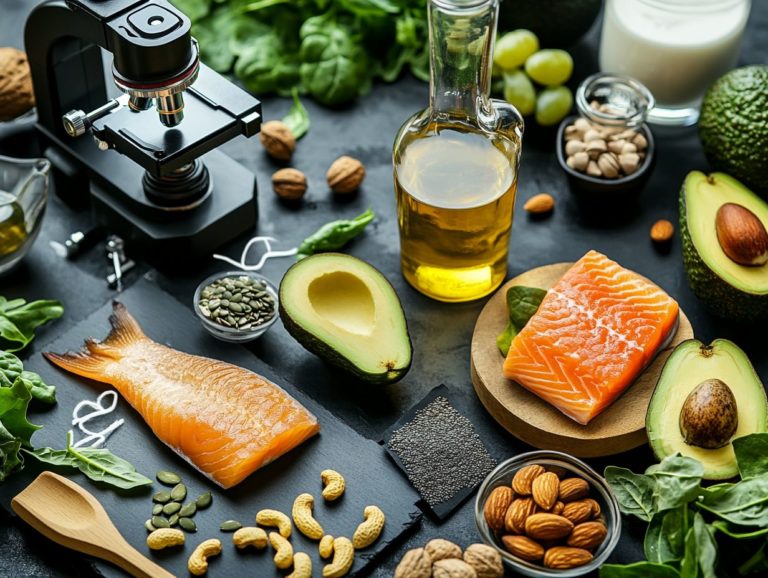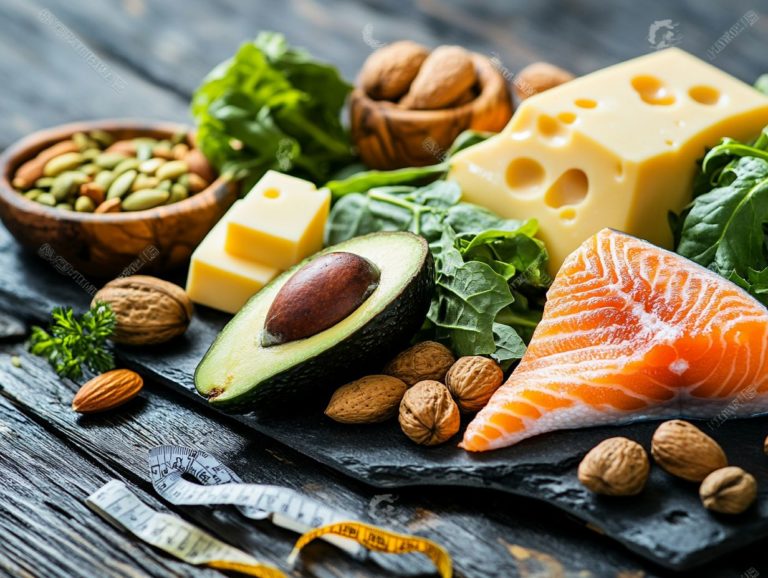The Best Sources of Healthy Fats
Healthy fats are not just a trend; they are essential dietary fats for your overall well-being, playing a pivotal role in heart health, brain function, and nutrient absorption.
With the overwhelming amount of information out there, it can be quite the challenge to discern which fats deserve a place in your diet, especially when considering the balance between good unsaturated fats and bad trans fats.
This article will illuminate some of the finest sources of healthy fats, from the creamy decadence of avocados to the nutrient-dense goodness of nuts and seeds.
You ll also find practical tips for effortlessly weaving these beneficial fats into your daily meals and snacks.
Dive into this guide and discover how to supercharge your health today!
Contents
- Incorporating Healthy Fats into Your Diet
- What Are Some Tips for Incorporating Healthy Fats into Our Diet?
- 1. Replace Unhealthy Fats with Healthy Fats
- 2. Choose Whole Foods Over Processed Foods
- 3. Cook with Healthy Fats
- 4. Snack on Healthy Fats
- 5. Be Mindful of Portion Sizes
- Frequently Asked Questions
- What are the best sources of healthy fats?
- How do avocados provide healthy fats?
- Why are nuts and seeds considered good sources of healthy fats?
- Can fatty fish be a part of a healthy diet?
- Is olive oil a healthier option for cooking?
- Can coconut oil be considered a healthy fat?
- What Are Some Tips for Incorporating Healthy Fats into Our Diet?
Key Takeaways:
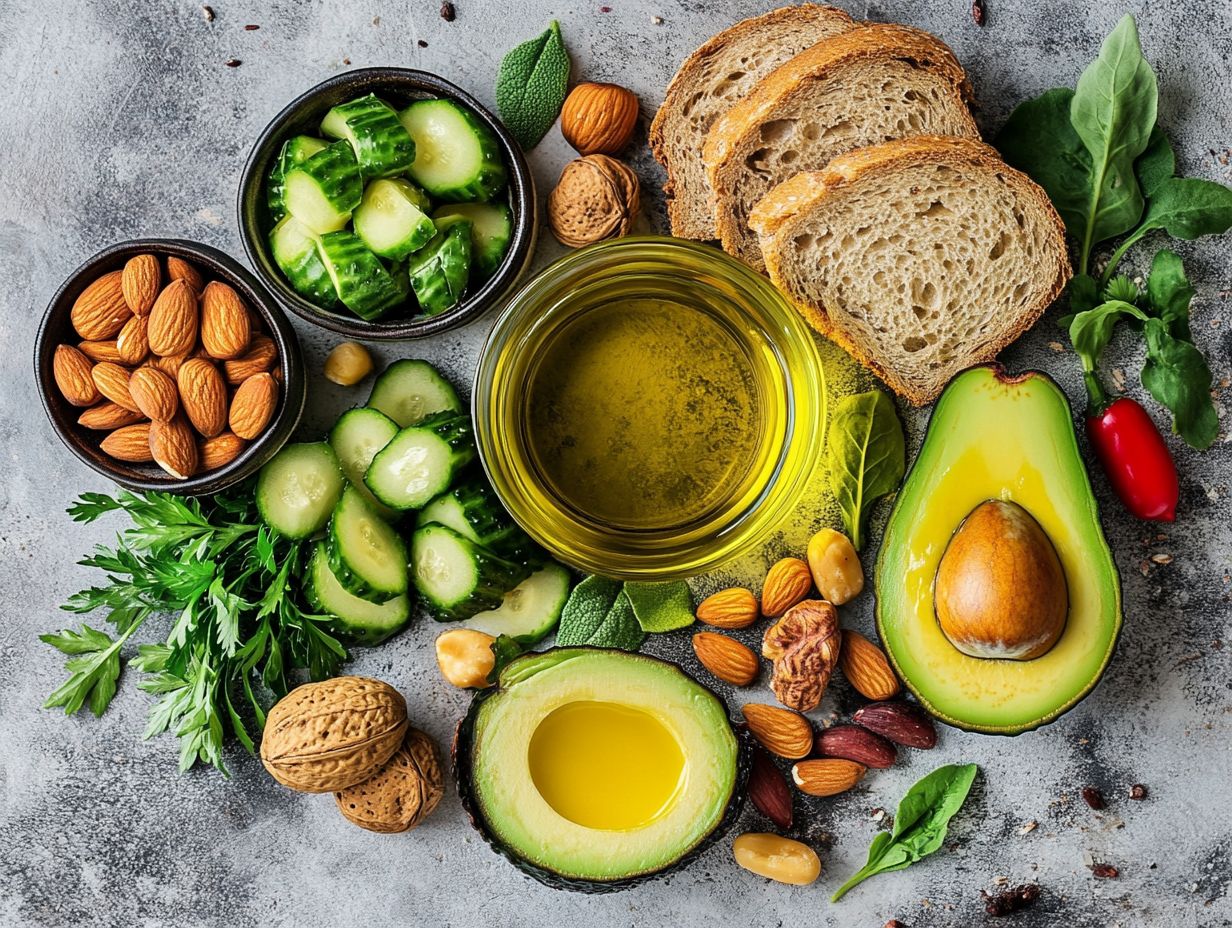
- Incorporating healthy fats, such as avocados and olive oil, into our diets is crucial for maintaining overall health and wellness.
- Making simple switches, like choosing whole foods over processed foods and cooking with healthy fats, can greatly improve our intake of essential fatty acids.
- Portion control is key when it comes to incorporating healthy fats into our diet. Snacking on nuts and seeds or adding a tablespoon of flaxseeds or chia seeds to meals are great ways to get a healthy dose of fats.
What Are the Best Sources of Healthy Fats?
Healthy fats are essential to your overall well-being, offering vital fatty acids that support a range of bodily functions, such as reducing inflammation, managing cholesterol levels, and maintaining cardiovascular health.
Research, including prominent studies like the Nurses Health Study and the Health Professionals Follow-up Study, underscores the significance of including beneficial unsaturated fats in your diet think avocados, nuts, and fatty fish while minimizing your intake of trans fats and saturated fats, which are commonly found in processed foods.
This approach not only helps reduce disease risk but also promotes effective weight management.
1. Avocados
Avocados are a powerhouse of nutrients, bursting with healthy monounsaturated fats that can significantly benefit your heart health and help reduce inflammation.
These healthy fats, especially oleic acid, have been shown to lower bad cholesterol levels, contributing to better cardiovascular wellness. When you incorporate avocados into your meals, you re not just adding a delicious element; you re embracing versatility.
Whether you slice them onto toast, blend them into smoothies, or toss them into salads, they elevate both flavor and nutrition, while also being an excellent source of dietary fat.
Studies show that including avocados regularly in your diet can aid in weight management and enhance overall nutrient absorption. Nutritional guidelines suggest enjoying a daily serving of this incredible fruit to fully experience its health benefits, reinforcing its essential role in a balanced, heart-healthy diet.
2. Nuts and Seeds
Nuts and seeds serve as exceptional sources of healthy fats, particularly polyunsaturated fats, and they bring along a wealth of additional benefits.
Rich in protein and fiber, they make for ideal snacks that support weight management.
These nutrient-dense powerhouses do more than just help you maintain a healthy weight; they play a vital role in promoting heart health as well.
Research indicates that incorporating a variety of nuts think almonds, walnuts, and pistachios into your diet can help lower cholesterol levels and reduce the risk of cardiovascular diseases.
Likewise, seeds like chia and flaxseeds bring their own heart-healthy perks, thanks to their omega-3 fatty acids.
To effortlessly weave these nutritious options into your daily meals, consider tossing a handful into your morning yogurt, blending them into smoothies, or sprinkling them as crunchy toppings on salads.
By diversifying your intake of nuts and seeds, you re not just nurturing your body; you re also savoring a delightful array of flavors while paving the way for a healthier lifestyle, including better cholesterol management and inflammation reduction.
Start today and experience the positive changes in your health!
3. Benefits of Olive Oil for Heart Health
Olive oil, particularly extra virgin olive oil, is revered for its abundant monounsaturated fats, associated with a reduced risk of heart disease. It’s a fundamental component of the Mediterranean diet, celebrated for numerous health benefits.
This versatile oil elevates the flavors of a wide range of dishes and provides a healthy alternative to less beneficial fats. Its remarkable antioxidant properties, including vitamin E and polyphenols, play a crucial role in promoting overall wellness by combating the harmful effects of free radicals.
Incorporate olive oil into your daily meals whether as a dressing for salads, a base for saut ing vegetables, or a final drizzle over grilled proteins. This makes it effortless to adhere to nutritional guidelines that support heart health.
Numerous health studies show that a diet rich in olive oil leads to improved cholesterol levels and lower blood pressure, aligning seamlessly with the principles of a heart-healthy lifestyle.
4. Fatty Fish: A Key to Heart Health
Fatty fish like salmon, mackerel, and sardines are your best allies in the quest for heart health. Rich in omega-3 fatty acids, these fish are essential for reducing the risk of heart disease, making them a vital addition to a balanced diet.
Incorporating these nutritious options into your meals not only elevates the flavor profile but also supports your cardiovascular wellness. For instance, salmon is abundant in EPA and DHA omega-3s celebrated for their ability to lower blood pressure and improve cholesterol levels.
Mackerel is another nutritional heavyweight that can be effortlessly grilled or baked for a satisfying dish. Don t underestimate sardines, often overlooked yet incredibly affordable; they can be enjoyed right from the can, tossed into salads, or featured in pasta dishes.
When preparing these fish with heart-healthy oils like olive oil and pairing them with whole grains and fresh vegetables, you re not just adhering to dietary guidelines you re crafting a wholesome and delightful plate that nourishes both body and soul.
5. Coconut Oil: A Versatile Kitchen Staple
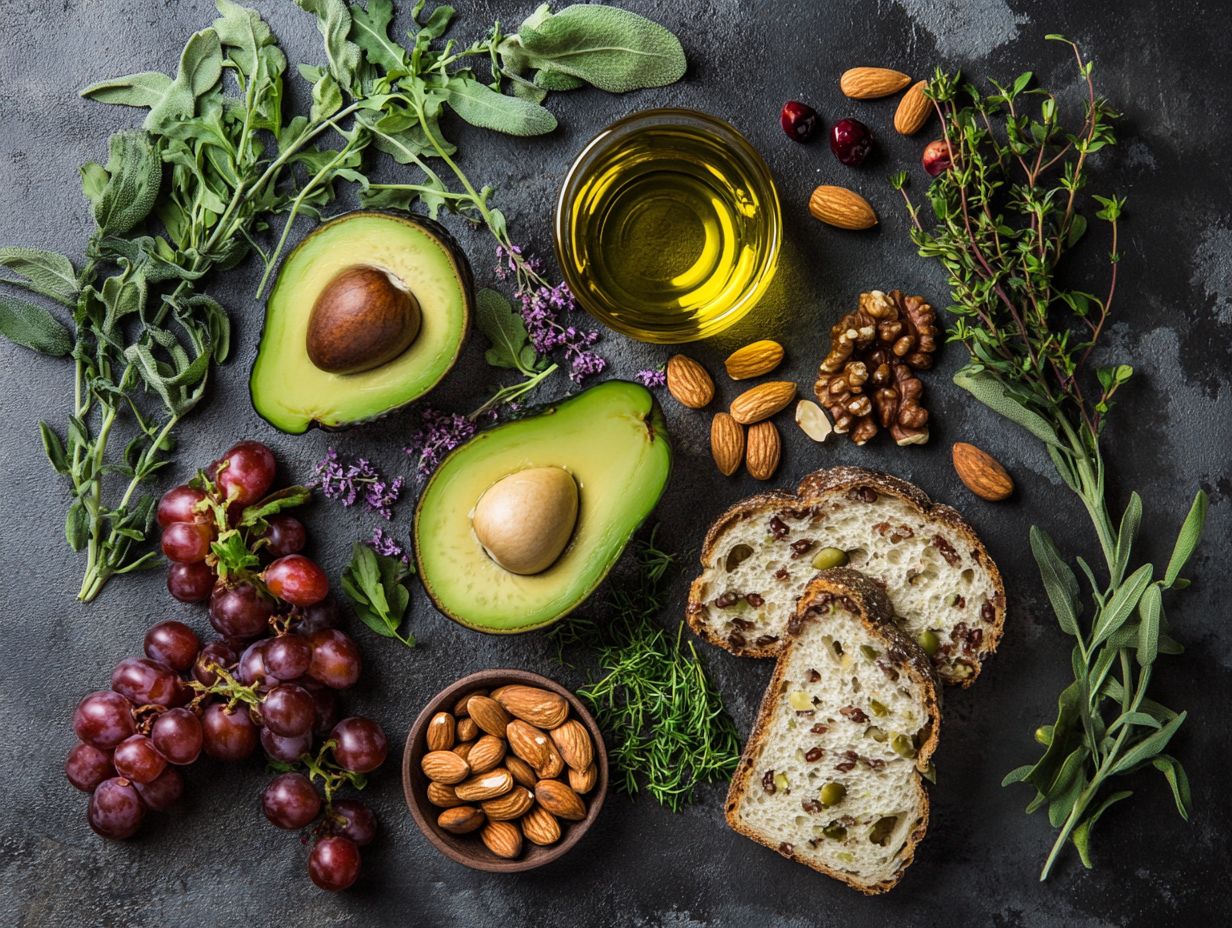
Coconut oil is packed with saturated fats but offers amazing health benefits. Its potential to aid in weight management and versatility as a cooking oil, thanks to its high smoke point, make it a fascinating choice for your kitchen.
This oil is predominantly made up of medium-chain triglycerides (MCTs), which your body can swiftly convert into energy. This is why it s favored by individuals following ketogenic or low-carb diets.
Beyond its practical culinary applications like saut ing vegetables, baking, or whipping up salad dressings coconut oil imparts a delightful flavor to various dishes, making it a popular choice among healthy high-fat foods.
The health community is somewhat divided on the topic of saturated fat intake. Some emphasize balancing dietary guidelines with personal health objectives. While some advocate for moderation, others champion including coconut oil, highlighting its unique properties and potential benefits for metabolic health.
6. Grass-fed Butter: A Nutrient Powerhouse
Grass-fed butter stands out as a rich source of healthy fats, combining a unique mix of saturated fats and vital nutrients like vitamin K2. This makes it appealing for those who prioritize their health.
Its impressive nutrient profile supports overall well-being and may positively influence heart health by improving cholesterol ratios and reducing inflammation. Compared to conventional butter, grass-fed varieties typically boast higher levels of omega-3 fatty acids and antioxidants, contributing to improved cardiovascular outcomes.
Incorporate this vibrant ingredient into your diet effortlessly; use it in cooking, spread it on whole-grain toast, or blend it into smoothies. Start incorporating grass-fed butter into your meals today for better heart health!
Embracing a balanced approach that includes a variety of healthy fats along with fruits, vegetables, and whole grains will further enhance its benefits and align beautifully with dietary recommendations, providing essential fatty acids and supporting heart health.
7. Dark Chocolate
Dark chocolate, especially varieties with a high cocoa content, is not just a delightful indulgence; it also offers a wealth of healthy fats and antioxidants that can enhance your heart health and overall well-being, all when enjoyed in moderation.
Boasting a rich profile of flavonoids, this luxurious treat is linked to a variety of health benefits, including improved circulation and reduced inflammation. Research indicates that these valuable compounds may contribute to lowering blood pressure and improving cholesterol levels, ultimately bolstering your cardiovascular health.
In terms of choosing dark chocolate, aim for products that contain at least 70% cocoa to maximize benefits and minimize added sugars. Incorporating it into your balanced diet is easy; just a small square can provide a satisfying conclusion to a meal or be a delightful addition to a fruit platter. This way, you can savor the exquisite taste while reaping the heart health rewards and aiding in blood sugar control.
8. Flaxseeds
Flaxseeds are a true powerhouse, brimming with omega-3 fatty acids and dietary fiber, making them an essential addition to any diet focused on enhancing heart health and overall wellness. They also contribute to inflammation reduction, an important factor in preventing chronic diseases.
These tiny seeds pack a punch when it comes to nutritional benefits; they can help lower cholesterol levels, regulate blood sugar, and support effective weight management. Additionally, they are rich in essential fatty acids.
The beauty of flaxseeds is their versatility imagine sprinkling them over your morning yogurt, blending them into smoothies for an extra nutritional boost, or incorporating them into delicious baked goods like muffins or pancakes.
Not only do flaxseeds introduce a delightful nutty flavor and texture to your meals, but they also align perfectly with dietary guidelines advocating for increased fiber intake. By weaving flaxseeds into your daily diet, you can relish their heart-healthy properties while ensuring your nutrition remains well-balanced.
9. Chia Seeds
Chia seeds are a treasure trove of omega-3 fatty acids and fiber, making them an exceptional choice for healthy snacks that not only support your protein intake but also promote digestive health and reduce heart disease risk.
These tiny seeds deliver a remarkable nutritional punch, effectively helping to lower cholesterol levels and reduce inflammation both vital for maintaining optimal heart health. Incorporating chia seeds into your daily meals is a breeze; they can seamlessly enhance smoothies, yogurt, or even baked goods, providing that extra nutritional boost you re after. They are also praised in nutritional guidelines for their benefits.
Their remarkable ability to absorb liquid creates a delightful gel-like texture, making them a fantastic addition to puddings and various desserts. With their high fiber content, chia seeds can also support weight management by promoting a sense of fullness, perfectly aligning with dietary guidelines that advocate for fiber-rich foods to achieve balanced nutrition.
10. Eggs
Eggs are a powerhouse of nutrition, offering you high-quality protein and healthy fats that are particularly beneficial for cholesterol management and your overall well-being.
These versatile gems are packed with essential vitamins and minerals, including vitamin D, B12, and selenium, making them a worthwhile addition to your dietary regimen. Their protein content plays a crucial role in supporting muscle development and repair, while the healthy fats help keep you feeling full and contribute to heart health.
Despite the common concerns surrounding cholesterol, research indicates that moderate egg consumption up to seven eggs a week doesn t significantly impact cholesterol levels for most people. Studies such as the Nurses Health Study and Health Professionals Follow-up Study have highlighted these findings. By incorporating eggs into your balanced diet, you can harness their impressive nutritional profile to support your journey toward optimal health.
Incorporating Healthy Fats into Your Diet
What Are Some Tips for Incorporating Healthy Fats into Our Diet?
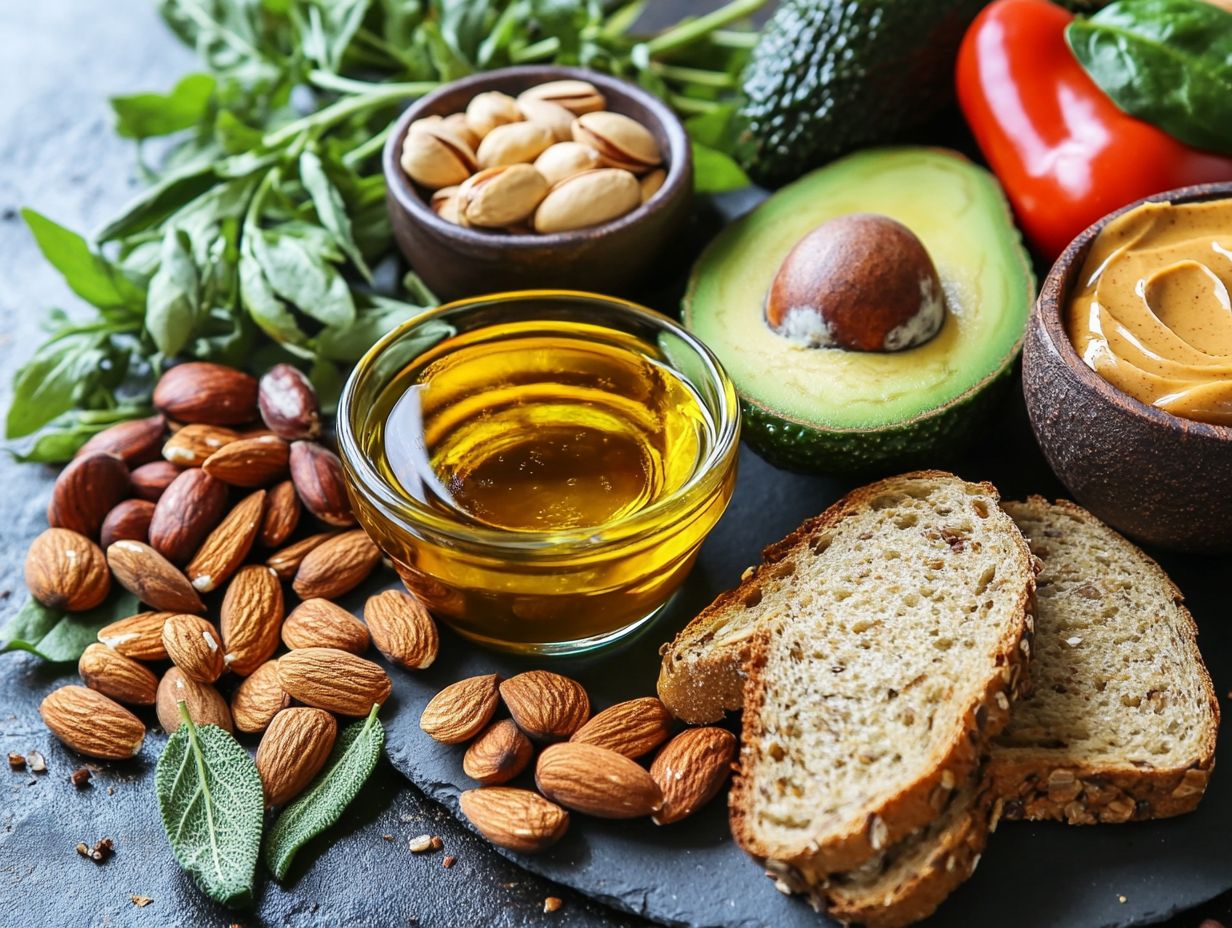
Incorporating healthy fats into your diet can greatly enhance your nutrition and support effective weight management. It can also improve your heart health. Following eating guidelines can help you make informed choices about healthy fats to include in your meals.
It s crucial to be mindful of portion sizes and the types of fats you choose. Start replacing unhealthy fats with beneficial unsaturated fats for a balanced diet.
Following recommendations that promote overall well-being will set you on a path toward a healthier lifestyle. Integrating healthy high-fat foods like full-fat dairy can be beneficial when done in moderation.
1. Replace Unhealthy Fats with Healthy Fats
One effective tip to enhance your dietary quality is to swap out unhealthy fats, like trans fats and excessive saturated fats. Opt for healthier options such as unsaturated fats found in plant-based oils and fatty fish.
Focus on choosing good unsaturated fats over bad trans fats. Emphasize monounsaturated and polyunsaturated fats.
Understanding where unhealthy fats lurk is essential. They often hide in processed foods like baked goods, margarine, and fast food.
Scrutinizing nutrition labels can help you identify these undesirable fats. This way, you can make wiser dietary choices.
Choosing substitutes like olive oil, avocados, and nuts can significantly boost your heart health. They help lower bad cholesterol levels and elevate the flavor of your meals.
These heart-healthy alternatives play a crucial role in reducing your risk of cardiovascular diseases, fostering a more balanced and health-conscious lifestyle.
2. Choose Whole Foods Over Processed Foods
Choosing whole foods over processed options is essential for enhancing your intake of healthy fats. This also minimizes harmful dietary elements like refined carbohydrates.
Opt for foods like avocados, nuts, seeds, and soybeans to contribute to better health.
Whole foods such as fruits, vegetables, whole grains, nuts, and seeds are a treasure trove of essential vitamins, minerals, and antioxidants. Processed foods often lack these nutrients.
These nutrient-dense choices support your overall health and deliver higher fiber content. This aids digestion and fosters a satisfying sense of fullness.
For example, selecting oatmeal instead of sugary cereals or opting for whole fruits rather than fruit juices contributes to a balanced diet brimming with nutrients.
By consciously incorporating whole foods into your daily meals, you can effectively manage your weight, enhance gut health, and lower the risk of chronic diseases.
3. Cook with Healthy Fats
Cooking with healthy fats like olive oil, coconut oil, and palm oil can elevate the flavor of your dishes. They provide essential nutrients that support cardiovascular health and overall well-being.
These versatile fats are key players in various cooking techniques, each offering unique advantages. For instance, saut ing with olive oil enhances taste and helps your body absorb fat-soluble vitamins from vegetables.
Roasting with avocado oil creates a wonderfully crispy texture, making it an excellent option for root vegetables and proteins.
Baking with oils like macadamia introduces a delightful nutty flavor, perfect for healthier dessert creations.
Integrating these oils into your cooking according to dietary guidelines improves the nutritional profile of your meals. It aligns your choices with health studies that highlight the benefits of including monounsaturated and polyunsaturated fats in your diet.
Additionally, incorporating healthy oils can contribute to better cholesterol management.
Incorporating healthy fats into your diet is essential for overall health. Make informed choices today to enhance your nutrition and well-being!
4. Snack on Healthy Fats
Snacking on healthy fats, like nuts and seeds, offers sustained energy and promotes that feeling of fullness, making them an excellent choice for maintaining a balanced diet throughout your day.
Incorporating these nutritious options into your daily routine not only supports your overall health but also aids in more effective weight management. These snacks are brimming with monounsaturated and polyunsaturated fats, known for their positive contributions to heart health and their supportive role in cognitive function.
To truly enjoy the benefits, practicing portion control is key; a modest handful of nuts or a couple of tablespoons of seeds can provide satisfaction without the risk of overindulgence.
Adding these nutritious gems to your yogurt, salads, or smoothies can enhance their nutritional profile, helping to keep your energy levels steady while curbing those hunger pangs between meals. Using healthy fats from nuts and seeds can also contribute to blood pressure control.
5. Be Mindful of Portion Sizes
Being mindful of portion sizes is crucial when you incorporate healthy fats into your diet. After all, even these nutritious fats are high in calories and can affect your weight management if you indulge too much. Practicing portion control is essential to avoid unwanted weight gain.
To keep your portion sizes in check, using measuring tools like kitchen scales or measuring cups can be incredibly helpful. Visual guides, such as using the size of your palm or thumb, can help estimate the right amounts of fats, such as olive oil and nut butters, without the hassle of precise measuring.
Striking a balance in fat intake is essential; guidelines typically recommend that 20-35% of your daily calories come from fats, prioritizing unsaturated options over their saturated counterparts. Practicing moderation is just as important, ensuring that your fats work in harmony with other macronutrients, which include proteins, fats, and carbohydrates, ultimately leading to a well-rounded and satisfying meal plan. Following nutritional advice can keep your dietary patterns in check, minimizing disease risk.
Frequently Asked Questions
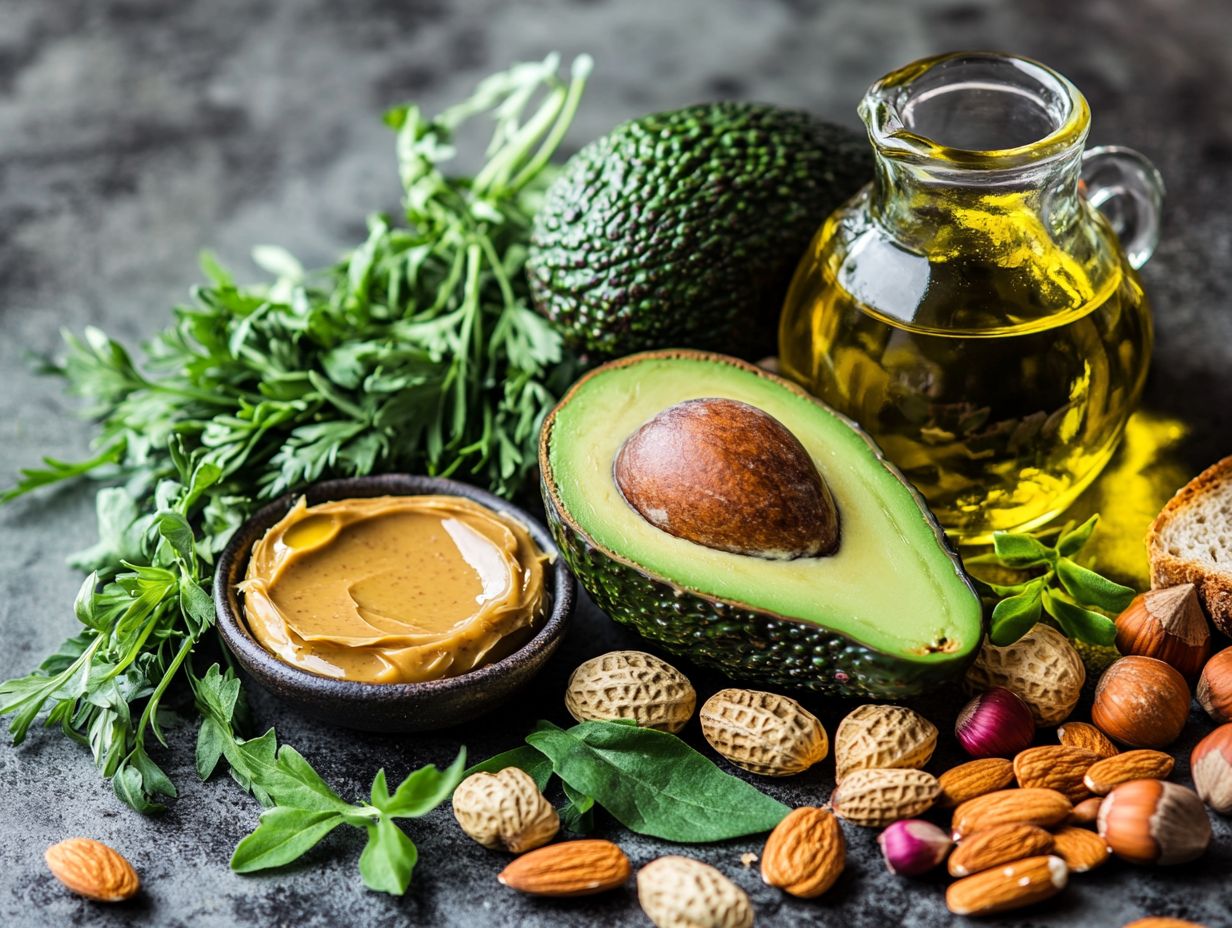
What are the best sources of healthy fats?
The best sources of healthy fats include avocados, nuts, seeds, fatty fish, olive oil, and coconut oil.
How do avocados provide healthy fats?
Avocados are a great source of monounsaturated fats, which can help lower cholesterol and reduce the risk of heart disease.
Why are nuts and seeds considered good sources of healthy fats?
Nuts and seeds are high in unsaturated fats, which can help improve heart health and reduce inflammation in the body.
Can fatty fish be a part of a healthy diet?
Yes, fatty fish like salmon, tuna, and mackerel are rich in omega-3 fatty acids, which can improve heart health and brain function.
Is olive oil a healthier option for cooking?
Olive oil is a healthier option for cooking compared to other oils, as it is high in monounsaturated fats and has been linked to lower rates of heart disease. It is considered one of the best healthy oils, fitting well into a heart-healthy diet and helping with cholesterol management and blood pressure control.
Can coconut oil be considered a healthy fat?
While coconut oil does contain saturated fats, it also contains medium-chain triglycerides, which have been linked to benefits such as increased metabolism and improved brain function. However, unlike unsaturated fats found in olive oil or fatty fish, the saturated fat content in coconut oil may still pose risks for cardiovascular health. Additionally, some saturated fats found in palm oil, along with coconut oil, can be part of healthy high-fat foods when consumed in moderation.


